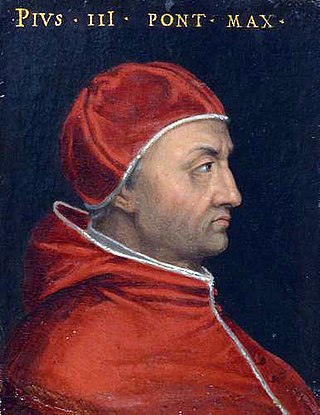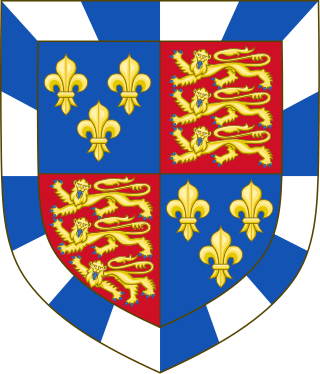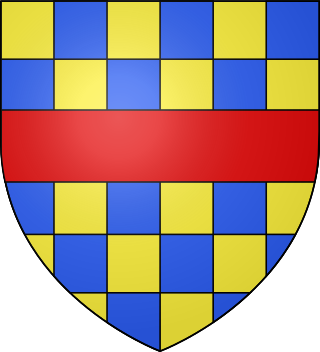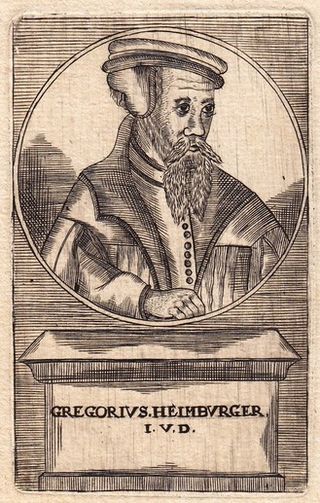
Pope Pius III, born Francesco Todeschini, was head of the Catholic Church and ruler of the Papal States from 22 September 1503 to his death. At just twenty-six days, he had one of the shortest pontificates in papal history.

The Battle of Towton took place on 29 March 1461 during the Wars of the Roses, near Towton in North Yorkshire, and "has the dubious distinction of being probably the largest and bloodiest battle on English soil". Fought for ten hours between an estimated 50,000 soldiers in a snowstorm on Palm Sunday, the Yorkist army achieved a decisive victory over their Lancastrian opponents. As a result, Edward IV deposed the Lancastrian Henry VI and secured the English throne.

Henry Beaufort, 3rd Duke of Somerset was an important Lancastrian military commander during the English Wars of the Roses. He is sometimes numbered the 2nd Duke of Somerset, because the title was re-created for his father after his uncle died. He also held the subsidiary titles of 5th Earl of Somerset, 2nd Marquess of Dorset and 2nd Earl of Dorset.

The Battle of Blore Heath was a battle in the English Wars of the Roses that was fought on 23 September 1459, at Blore Heath, Staffordshire. Blore Heath is a sparsely-populated area of farmland two miles east of the town of Market Drayton in Shropshire, and close to the village of Loggerheads, Staffordshire.

The Battle of Northampton was fought on 10 July 1460 near the River Nene, Northamptonshire. It was a major battle of the Wars of the Roses. The opposing forces were an army led by nobles loyal to King Henry VI of the House of Lancaster, his Queen Margaret of Anjou and their seven-year-old son Edward, Prince of Wales, on one side, and the army of Edward, Earl of March, and Warwick the Kingmaker on the other. The battle was the first in which artillery was used in England.

John Clifford, 9th Baron Clifford, 9th Lord of Skipton was a Lancastrian military leader during the Wars of the Roses in England. The Clifford family was one of the most prominent families among the northern English nobility of the fifteenth century, and by the marriages of his sisters, John Clifford had links to some very important families of the time, including the earls of Devon. He was orphaned at twenty years of age when his father was slain by partisans of the House of York at the first battle of the Wars of the Roses, the Battle of St Albans in 1455. It was probably as a result of his father's death there that Clifford became one of the strongest supporters of Margaret of Anjou, wife of King Henry VI, who ended up as effective leader of the Lancastrian faction.

James Butler, 5th Earl of Ormond, Earl of Wiltshire was an Anglo-Irish nobleman and soldier. Butler was a staunch Lancastrian and supporter of Queen consort Margaret of Anjou during the Wars of the Roses. He was beheaded by the victorious Yorkists following the Battle of Towton.

Sir Andrew Trollope was an English professional soldier who fought in the Hundred Years' War and the Wars of the Roses.

Gregory of Heimburg was a German jurist, humanist and statesman.
Events from the 1460s in England.

Giovanni Francesco Commendone was an Italian cardinal and papal nuncio.

Sir James Strangeways was Speaker of the House of Commons of England between 1461–1462. and a close political ally of Edward IV's Yorkist faction.

Robert Hungerford, 3rd Baron Hungerford was an English nobleman. He supported the Lancastrian cause in the War of the Roses. In the late 1440s and early 1450s he was a member of successive parliaments. He was a prisoner of the French for much of the 1450s until his mother arranged a payment of a 7,966l ransom. In 1461, after defeat on the Towton battlefield on 29 March, he fled with Henry VI to Scotland. In 1461 he was attainted in Edward IV's first parliament, and executed in Newcastle soon after he was captured at the Battle of Hexham.

The Second Battle of St Albans was fought on 17 February 1461 during the Wars of the Roses in St Albans, Hertfordshire, England.

Bartolomeo Roverella (1406–1476) was an Italian Roman Catholic bishop and cardinal.
Stefano Nardini was an Italian Roman Catholic bishop and cardinal.
Joan Margarit i Pau, or in Spanish Juan Margarit y Pau, was a prominent Catalan prelate, a bishop of Girona and a cardinal.

John Beaumont, 1st Viscount Beaumont, was an English nobleman and magnate from Folkingham, Lincolnshire. He was a councillor to King Henry VI and was rewarded for his services, becoming a leading member of the East Anglian nobility. Beaumont held numerous offices for the crown, and was promoted up the peerage to become the first man with the rank of viscount. He also amassed immense personal wealth, acquired through inheritance, marriage, and royal patronage.

The siege of the Tower of London was an episode of the Wars of the Roses, in which adherents of the rival Plantagenet houses of Lancaster and York were pitted against each other. In June 1460, several Yorkist nobles, who had unsuccessfully rebelled against King Henry VI the year before and had fled to Calais, invaded the south east of England at Sandwich. They enjoyed widespread support through popular discontent with the ruling court among the populace of Kent and the merchants of London, and were greeted by enthusiastic crowds when they entered London on 2 July.

Ludovico da Bologna was an Italian diplomat and churchman. A lay Franciscan, he traveled extensively on diplomatic missions for both the Holy See and various powers, both Christian and Islamic. The overarching goal of his travels was the creation of an alliance against the rising power of the Ottoman Empire. In 1461, he was named Patriarch of Antioch, but he never received canonical investiture.














